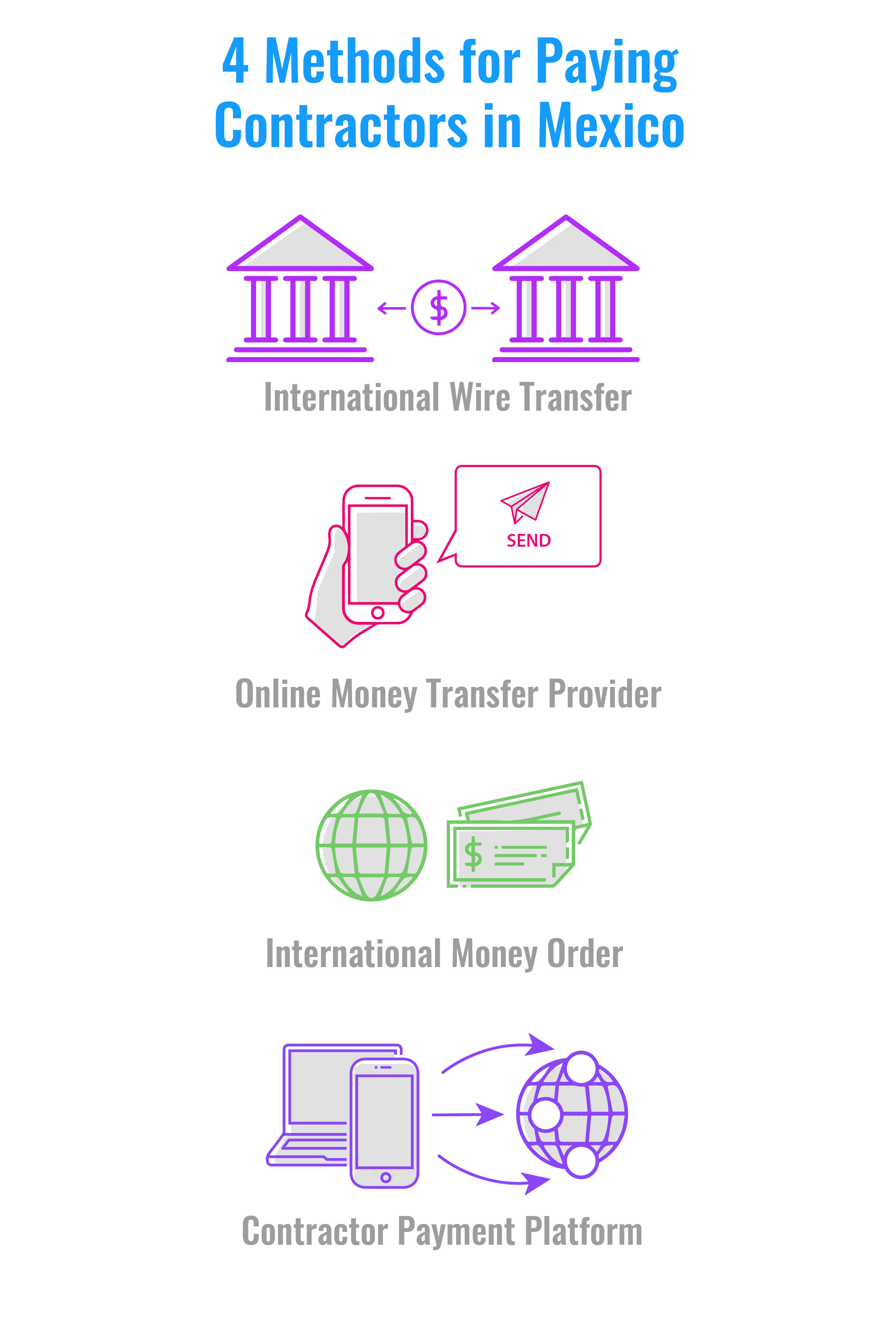The demand for international contractors is growing as companies look to target talent with specialized skills and tap into new foreign markets for global expansion.
Mexico is a desirable location to find contractors for several reasons. Not only is Mexico the second largest economy in Latin America and among the 15 largest economies in the world, but its proximity to the United States serves as a strategic location for U.S. companies to engage contractors. The country also offers access to a skilled workforce within the science, technology, engineering, and mathematics (STEM) fields for a competitive cost of labor.
Ready to engage Mexico’s talent pool? This guide simplifies how to pay contractors in Mexico.
Can You Hire Contractors in Mexico?
Yes. Even if your business is not located in Mexico, you can still hire and pay contractors there. The process differs from hiring employees in Mexico, where you would either establish an entity in Mexico or partner with an employer of record (EoR) to hire, pay, and manage foreign employees.
When engaging a contractor in Mexico, follow the correct classification, create a locally compliant contract, and collect a Form W-8BEN (if your business is in the U.S.) to classify their status as a foreign worker and non-citizen. Then you’re ready to pay your contractor.
How to Pay Contractors in Mexico: 4 Ways
There are four approaches to paying a contractor in Mexico: through an international wire transfer, online money transfer provider, international money order, or contractor payment platform. Work with your international contractor to determine which option works best for
payments.

International Wire Transfer
An international wire transfer electronically moves money from your bank to the recipient's bank through the Society for Worldwide Interbank Financial Telecommunication (SWIFT) network.
This payment method is one of the most common approaches to paying international contractors because it is easy and secure, and it ensures your payment goes directly to the contractor’s account.
However, international bank transfers can take up to five business days to receive and may not be the best option if you need to pay the contractor quickly. This payment method also comes with substantial banking and exchange rate fees.
Online Money Transfer Provider
Money transfer providers like PayPal, Xoom, and Wise offer companies a quick and convenient way to pay contractors online. Users simply create an account, add their bank or credit/debit card details, and instantly send or receive money through an app.
Still, some online payment systems are prohibited in certain countries and do not protect your business from contractor compliance violations. Plus, while these payment systems are free to set up for both the sender and recipient, they come with business fees, bank transfer fees, and exchange rate fees.
International Money Order
An international money order is a prepaid check that can be mailed to and cashed anywhere in the world. Businesses can purchase money orders at all-purpose locations, such as grocery stores and post offices.
This method of payment is a universal and easily accessible option because you don’t need a bank to purchase the money order, and your contractor doesn't need a bank to cash it.
However, an international money order is not the fastest method to pay your contractor in Mexico. For instance, payments may be delayed due to postal service issues. Contractors must also have a local place to cash the order. Additionally, international money orders may come with fees on both sides of the exchange.
Contractor Payment Platform
A contractor payment platform enables you to onboard and pay contractors across international markets. This automatic payment solution integrates foreign exchange fees into your payments and transfers funds to the contractor in their location.
A contractor payment platform is a seamless, all-in-one solution to pay your contractor in Mexico. Some platforms even offer extra features, such as locally compliant contract templates and an assessment of your international contractor risk.
However, a contractor payment solution only handles pay and not classification compliance, so you may want to consider a contractor management solution that helps you manage contractors and maintain compliance.
Employees vs. Contractors in Mexico: What Is the Difference?
Related: Hiring Employees in Mexico: A Comprehensive Guide
According to the Mexican Federal Labor Law (FLL), an independent contractor is an individual or a legal person (such as a company) who receives wages when rendering their services but will not be subject to the authority of the beneficiary of said services, such as a work schedule.
While labor relationships are regulated by the FLL, independent services are regulated under the civil or commercial codes. Other differences between employees and contractors in Mexico include:
- Social security. An employee’s salary is subject to income tax (ISR), and the employer is obligated to withhold and pay this tax and other local payroll taxes on the employee’s behalf. An independent contractor is responsible for paying ISR, and their independent services are subject to Value Added Tax (VAT) payment.
- Benefits. The FLL grants all employees in Mexico certain fundamental, non-waivable rights, including social security, a year-end bonus, annual vacation, and mandatory paid holidays. Independent contractors are not entitled to any benefits other than anything specifically agreed upon with the company.
The Risks of Hiring an Independent Contractor in Mexico
Working with and paying contractors in any foreign market comes with challenges. Some common risks businesses face when engaging international contractors include:
- Permanent establishment. If a business has a fixed location in another country and is generating revenue, it triggers permanent establishment. Permanent establishment means that the company could be subject to local corporate taxes and liable for tax penalties and other legal issues if it does not adhere to regulations.
- Misclassification risk. Misclassification occurs when a company engages with a contractor and treats them like a full-time employee, such as managing the contractor’s work schedule or paying them a fixed salary. An individual could claim that they have been misclassified as a contractor and are instead entitled to employee benefits.
- IP protection. It is difficult to protect your intellectual property (IP) in overseas markets when working with an international contractor. If a company’s IP is trademarked or registered in its home country, it is not protected in any other country. Companies should consider working with an in-country attorney to legally protect their IP under Mexico’s guidelines.
Simplify Paying Your Contractors in Mexico
Hiring an independent contractor in Mexico gives you access to the skills you need to grow and expand your global workforce. While there are several methods for paying contractors in Mexico, a trusted partner can make all the difference. Working with a team of experts ensures you bring in the right talent and maintain compliance in the process.
Velocity Global provides everything you need to effortlessly engage and pay contractors in Mexico. Our Contractor Management (Agent of Record) solution helps companies avoid misclassification risks and compliantly engage, onboard, pay, and manage international contractors. If you need a simple solution for automating payments, our Contractor Payments platform enables you to accurately and compliantly pay your contractors with ease.
Contact Velocity Global today to learn how our Contractor Management and Contractor Payments solutions support your contractors in Mexico.



